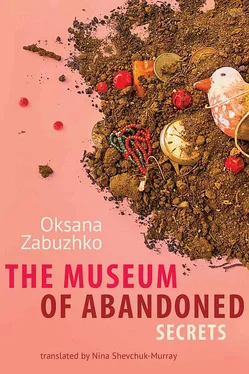Lolly must have been running late: her cup and the spoon she used to stir her coffee tossed willy-nilly in the sink, the squishy grounds in the rusty-brown filter still warm in the coffeemaker. The bowl with unfinished muesli she left on the windowsill makes me go all warm and fuzzy, and I catch myself smiling: I know she stood here, eating, looking out the window into the well of our yard, as she always does when she eats alone. Walking around the kitchen like this, retracing her steps—it’s like pulling on a still-warm robe she’s taken off and left hanging invisibly in the air; you can wrap yourself in it, you want to rub your cheek against her, Lolly. And the smell—the waft of her perfume lifted off the pillow where she slept, warm with the sweet, yeasty, bread-dough smell of her body—it follows me around, grows stronger by the window where she stood, washes over me at the door where she put on her boots. I press my fingers against my nose and inhale a slightly different version of her—a sharper, saltier tinge like the smell of seaweed drifting in from a distant beach—draw it in, and hear myself moan, unwittingly. What a joke! I’m like a dog left in the house alone, nosing his way around, looking for his master. When she first began staying the night, I did exactly what a dog would do after she’d left: I burrowed into her bathrobe and went back to sleep until she returned. The only social gesture I could muster was to call the office and lazily lie to them about feeling under the weather—I’ve no idea whether they ever bought the excuse, delivered as it was in a blissed-out drone; and I didn’t care, and when you don’t care, you’re always ahead because no one can do anything to you. I’d lounge in my nirvana bed until noon—sleeping, waking, dozing off again, marveling joyfully at the change of light and the objects in the room that seemed unrecognizable once they’d responded, like salient creatures, to Lolly’s vibrating presence—and never had the guts to tell her about it. But it was then, actually, that I started having these dreams.
In the daytime, they fade, melt, sink under the surface like shards of cracked ice floes. They’re all thin around the edges; I lose the plot, only grasp the biggest pieces, stacked on top of each other but disjointed like pages from different chapters caught by a single wayward staple: the black Opel Kadett, some sort of place like a hospital, the spatula or whatever it is, the white-sheeted torso. Normally that’s how it is with dreams, especially when your mind is stuffed fuller than your in-box, and you wake up like someone slammed your face against a table: not this again, damn it, can I please think of something else? But these dreams, they were different from the get-go. First of all, they aren’t just a fantastical reworking of whatever happened the day before; they’ve no relationship to anything I could ever have personally experienced. No déjà vu whatsoever. As best I could articulate this to Lolly—because it is always when I talk to her that I can best verbalize my ideas, even when it’s the operational principle of a thermionic generator or something else she has no clue about— these dreams feel like I’ve been put inside someone else’s closet, and I’m looking at a stranger’s clothes, hung around in strange order. What I see and manage to remember certainly means something to someone out there, but I myself feel like the person who accidentally got plugged into someone else’s phone conversation.
“Do you mean to say,” Lolly then inquired, frowning and biting her lower lip in concentration, “that you are seeing someone else’s dreams?”
“No, that’s the thing, that’s their other distinction: it’s more precise to say that I’m dreaming someone else’s consciousness.”
“Meaning?”
“Um, how do I put it… it doesn’t look like a dream—more like a memory, a very vivid, visceral memory, with touch and smell—only I am absolutely certain that whatever is happening has never happened to me . I know it’s not my memory.”
One undisputable advantage of living with a reporter is that with time, thanks to her extraordinary skill of patient questioning, she trains you to explain yourself with great coherence and in perfectly clear language, plus your vocabulary expands to such unprecedented levels that sometimes people think you’re the one who writes for a living. So, here’s the picture—stuck in my mind after I dreamt it a least a dozen times: a forest in springtime, tree trunks spotted with sunlight, the smell of wet bark and sap, a very green smell, and the man walking in front of me is dressed in a gray-blue military uniform with a Schmeiser over his shoulder, only his belt is not made of leather, for some reason, but woven, with stitching. We are walking through the forest “goose-file”—somehow I know that’s what it’s called—and this sturdy peasant back, girded with its woven belt, is the last thing I see when a dry stutter explodes from behind the trees; something shoves me hard in the chest, and everything goes black. After that, I don’t remember anything—it’s gone like a piece of paper in dark water. A bit later, after she’d had a chance to confer with knowledgeable people—she knows more experts in various fields than the State Reference Library, all she has to do is pick up the phone—Lolly, excited as Sherlock Holmes on a case, reported that such woven, stitched belts do, in fact, exist, and have for quite a while—as part of the US Army uniform. You see, that’s what I mean—how would I ever know that?
“Okay, what about that Schmeiser? Are you sure it was a Schmeiser?”
“Absolutely, and the forest looked very much like our forests here, not the American woods, and more than that—in my dream, I knew what everything was called, not just the trees but even the bushes: thorn apple, heather, juniper.”
“Well, that actually doesn’t surprise me at all—you could have picked those up somewhere, in passing, like when you went hiking with your mom when you were little, the time you climbed Goverla, and then just forgot…”
“But by this logic, is it the same with the American uniform: I knew it once, then I forgot? Is that what you’re trying to tell me?”
In response, Lolly arranged her face into one of her proprietary contortions: one lip thoughtfully pursed, brows scrunched together, eyes like a pair of tiny pointy horns—“the silence of the wolves” it’s called, when she runs out of arguments but doesn’t want to admit defeat (she also has “the silence of the lambs”—with big, piteous eyes, when she’s begging for mercy)—and, of course, as always, I had to laugh and hug the little imp. But I also had to wonder: Heck, what if I had seen a uniform like that somewhere before, like on one of those shoddy posters in military prep classes? We’re all Cold War children after all, and those with technical education especially—all groomed to work for our dear ol’ military industrial complex, which, may it rest in peace—met such inglorious demise that I’m the last one of our class who still, at least on paper, counts in the ranks of our profession, although others never relied on it for their bread and butter, and it’s good they didn’t because it wouldn’t get you a single dry a crumb now. I’m lucky I liked playing with Uncle’s cigarette holders when I was a kid—who knew I’d start a business out of that, ha!—but I still remember the u-es-es-arr’s terrible military secrets, like the fact that the diameter of our noodles matched the caliber of our bullets, and that our cocoa factories were engineered to switch to manufacturing gunpowder in twenty-four hours, so why shouldn’t some rotten layer of my collective unconscious spit up a long-forgotten detail about those dirty imperialists we were so keen to fight?
Читать дальше












